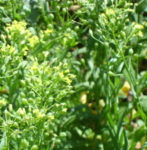The educational materials listed on this page are about Biodiesel.
What is biodiesel? Biodiesel is an alternative fuel created from plant and living matter that is converted to a usable energy source. Biodiesel fuel is used in standard diesel engines and is different from the vegetable and waste oils used in converted diesel engines. Biodiesel can be used alone, or blended with petrodiesel in any proportion for biodiesel production. Biodiesel feedstock can include agronomic crops, or other biomass from industrial or municipal wastes. Key practices include byproduct utilization, bioenergy and biofuels, anaerobic digestion, biodiesel, biofuel feedstocks, nutrient cycling, municipal wastes, renewable energy.
SARE’s book Building a Sustainable Business helps farmers build both a sustainable and profitable business plan that includes renewable energy and biofuel. The SARE bulletin Clean Energy Farming: Cutting Costs, Improving Efficiencies, Harnessing Renewables helps farmers utilize clean energy practices on their operations. These practices may include utilizing byproducts for biodiesel production and other renewable fuels. The Farm Energy Topic Room provides a wealth of information on clean energy topics, including biodiesel, farm energy audits, solar and wind energy, and more. For safety best practices in small-scale biodiesel production, see the Penn State publication Biodiesel Safety and Best Management Practices for Small-Scale Noncommercial Use and Production.
Showing 1-1 of 1 results

Growing Camelina for Biodiesel
This bulletin investigates the tradeoffs for a potential on-farm biodiesel production enterprise from dryland camelina to understand when and if it can be economically viable. Is Biodiesel from Camelina Right for You? This bulletin is based in part on on-farm trials evaluating camelina sativa production. Download an interim report from this research.